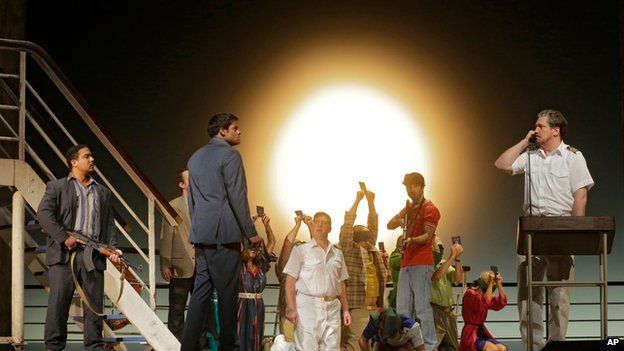Free speech, 'psychological rape' and the Death of Klinghoffer
- Published
- comments

The Monday night New York opening of the Death of Klinghoffer by American composer John Adams has set off a fierce debate over art, religious intolerance and free speech.
The opera is loosely based on the 1985 hijacking of the Mediterranean cruise ship Achille Lauro by Palestinian militants and the subsequent murder of one of its passengers, 69-year-old disabled American Leon Klinghoffer.
On Tuesday night Metropolitan Opera general manager Peter Gelb spoke with BBC Newsnight's Evan Davis, addressing critics who contend that the opera presents a favourable view of the Palestinian killers.
"We presented this opera because it is the work of America's leading composer of opera," he says. "It is not anti-Semitic. It does not glorify terrorism."
He says that Death of Klinghoffer is a "sympathetic portrait of the victims of this act of terrorism."
Writing in the New York Daily News, attorney Martin Garbus agrees that the Death of Klinghoffer exposes and addresses destructive hatred.
"This opera shows the causes and consequences of the killing of Jews or members of any group," he says. "Any debate that the opera triggers is a worthy one. Any discussion of the grievances, frustrations and anger of one group against another serves a valuable purpose."
Much of the debate over the opera turns on establishing what it most resembles. The New York Daily News's Linda Stasi compares it favourably to other provocative artistic works, such as Salman Rushdi's Satanic Verses, Nikos Kazantzaki's the Last Temptation of Christ and William Shakespeare's the Merchant of Venice.
"Each one of them has been condemned for either racism, religious bigotry, anti-Semitism, homophobia or just for presenting a new, albeit controversial take on an old religion," she writes.
She says art often is meant to be controversial - it "isn't bland happy pictures sold in big-box stores".
The Washington Post's Anne Midgette agrees that condemning art for presenting unappealing viewpoints is a banal.
"While the idea that audiences might blindly go out and emulate the behaviour they see on stage is a canard that I've heard applied to Wagner's Ring with equal ludicrousness at least, I've not encountered any real-life cases of sibling incest following performances of Die Walkure," she writes.
Floyd Abrams, a New York lawyer, constructs a hypothetical he says exposes the hypocrisy of the opera's backers, who are hiding behind constitutionally protected free speech.
Would Americans, he asks, be so supportive of a two-sided discussion about the assassination of Martin Luther King Jr? Or of the 9/11 attacks?
"Surely we recoil at all of these," he writes in the Wall Street Journal. "They all would be protected by the First Amendment… But it is inconceivable that the Metropolitan Opera would have chosen to offer the public any of the operas I have just hypothesised."
Klinghoffer's murder, he writes, was an "unspeakable act" that cannot be debated or rationalised.
During his interview with BBC, Mr Gelb said that he wished those demonstrating against the opera would see the work for themselves before passing judgment.
The New York Sun's Seth Lipsky attended the performance and still thinks the work should be condemned.
"It is bizarre to sit in an opera house in the middle of the city with the world's second largest Jewish population and hear its performance greeted with a long ovation while the conductor and cast take their bows."
Harvard law Prof Alan Dershowitz also attended the opera and identifies the competing Palestinian and Jewish choruses at the beginning of the work as evidence of its anti-Semitic bias.
"The goal of that narrative chorus is to compare the displacement of 700,000 Palestinians - some of which was caused by Arab leaders urging them to leave and return victoriously after the Arabs murdered the Jews of Israel - with the systematic genocide of six million Jews," he writes in the Jerusalem Post. "It was a moral abomination."
He calls Death of Klinghoffer "more propaganda than art", designed to "create a false moral equivalence between terrorism and its victims, between Israel and Palestinian terrorist groups, and between the Holocaust and the self-inflicted Nakba".
American Interest editor Walter Russell Mead, writing for Time magazine, says he doesn't have a problem with the work's attempt to present the views of the Palestinian hijackers.
"Terrorists, however reprehensible their actions, are human beings, and it is not beyond the province of art to seek to examine and understand, so far as is possible, their motives," he says.
More concerning, he says, is that the Metropolitan Opera and Mr Adams are profiting from the Klinghoffer family's tragedy, calling it "psychological rape".
"No family not already in public life deserves to have their most intimate and painful moments taken over and made into a public spectacle against their will," he writes.
Klinghoffer's two daughters themselves took to the opinion pages, writing a piece earlier this week for the Israeli paper Haaretz.
"Long ago we resolved never to let the last few minutes of Leon Klinghoffer's life define who he was as a man, husband and father," they write. "Opera patrons will only see Leon Klinghoffer presented as a victim - he was so much more."
It's been 23 years since the Death of Klinghoffer first premiered, and the work has been performed in Europe and the US - including New York - without the level of opprobrium this week's production provoked.
As anti-Israel demonstrations in Europe are increasingly laced with anti-Semitic rhetoric and war spreads in Iraq and Syria, however, it seems that the work has taken on added meaning in the current political climate.
Events such as the Achille Laura hijacking that could, and perhaps should, be receding into history are as painful and provocative today as they were almost 30 years ago.
- Published20 October 2014
- Published18 June 2014
- Published18 May 2011